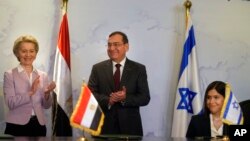Egypt, Israel and the European Union signed a gas deal Wednesday in which Egypt will export Israeli liquified natural gas to Europe via two Egyptian LNG plants.
The memorandum of understanding was inked at the East Mediterranean Gas Forum in Cairo, expanding upon gas cooperation among the three partners.
Representatives of participants at the gas forum applauded announcement of the deal. Egypt is the only country in the gas forum to have plants that can produce liquified natural gas.
Egyptian political sociologist Said Sadek told VOA that the announcement of the deal formalized cooperation among the EU, Egypt and Israel that has been going on for several months.
"This is a memo of understanding between Egypt, Israel and the EU that they will increase the gas production from Israel and Egypt, will process it and make it liquified, and export it to the EU," Sadek said. "Already this is going on. A lot of things have been going on in the last few months in the gas field between Egypt, Israel and the EU. Now, this is just to add more."
Sadek also said the U.S. "is currently trying to negotiate a settlement to the maritime territorial dispute between Israel and Lebanon so that the gas in the disputed sector can be used as part of the current deal with the EU."
Al Jazeera TV reported that Russia cut exports of its natural gas to Europe on Wednesday "as a sign of displeasure at the deal signed in Cairo."
Paul Sullivan, a Washington-based energy analyst at the Atlantic Council, told VOA that "the deal between the EU, Egypt and Israel to export LNG to the EU is one way the European Union can continue to extract itself from” what he called "over-reliance on Russian gas," and that this "could benefit both Egypt and Israel economically and strategically."
Egyptian President Abdel Fattah el-Sissi told a joint press conference with European Commission President Ursula von der Leyen that the agreement signed in Cairo was part of what he called "increasing cooperation between Egypt and the EU in numerous fields," amid a difficult global political and economic period.
Sissi also thanked Egypt's political partners, including the EU, for helping to "mitigate the effects of increasing food prices and the current crisis that is affecting many developing countries."
Von der Leyen said during the press conference that the EU would contribute financially and technologically to help Egypt with food production.
"These investments will support food systems in your region and elsewhere so that we can together discuss how to develop solutions and technologies … modern technologies of precision farming … new crops adapted to climate change, because it is important for us that the production of food in the region is increased and the dependency on other regions is decreased," she said.




